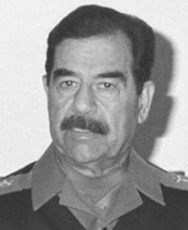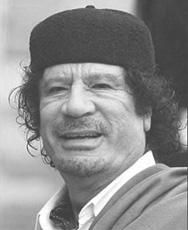Who decides on waging wars?
| Activities - Comments |
by Hannes Hofbauer
To eliminate a development project: Was this the reason behind waging war against Libya?
 Since the breakdown of the Soviet Union, the Comecon and the Warsaw Treaty Organisation in 1991, three heads of states, odious to Western governments and institutions such as USA, EU and NATO were killed by them, respectively died under their responsibility. This is remarkable.
Since the breakdown of the Soviet Union, the Comecon and the Warsaw Treaty Organisation in 1991, three heads of states, odious to Western governments and institutions such as USA, EU and NATO were killed by them, respectively died under their responsibility. This is remarkable.
On the 11 March 1996 Slobodan Miloševic, former president of Yugoslavia, was left without medical help during his trial in the International Criminal Tribunal for the former Yugoslavia in Den Haag and died in his cell in Scheveningen.
On the 30 December 2006 Saddam Hussein, former prime minister and president of Iraq was hanged in Al-Kadhimiya North-East of Baghdad.
On the 20 October 2011 Muammar al-Gaddafi was lynched in Sirte.
What do these three dead leaders have in common?
First and visible the brutal form of their elimination. No serious trial, no hearing, no international examination took place concerning their guilt or responsibility for alleged war crimes.
Western media convicted them by following the will of the Western military alliance surrounding NATO.
In the moment of their elimination all of them were presented as the personification of evil. This demonization even allowed exposing – in the case of Gaddafi and Saddam Hussein and his sons – their distorted dead bodies to the public.
Media consumers were supposed to look at them as devils not as human beings. This form of brutalisation also shows a historical step backwards in terms of standards of civilization. Miloševic, Saddam Hussein, and Gaddafi were physically eliminated because they were enemies, not because of their crimes, and for sure: all three were criminals, responsible for monstrous crimes. But these crimes – repressive policy towards ethnic minorities and political opposition – served the West only as a pretext for military interventions.
Miloševic, Saddam Hussein, and Gaddafi were physically eliminated because they were enemies, not because of their crimes, and for sure: all three were criminals, responsible for monstrous crimes. But these crimes – repressive policy towards ethnic minorities and political opposition – served the West only as a pretext for military interventions.
This is the only interpretation possible because political oppression is taking place all over the world without the “international community” considering a military intervention.
From Saudi Arabia to Spain [Basque country], from Nigeria to Indonesia: Nato would have their hands full of work to send their armada to combat for human rights.
Only in specific cases the Western allies take military action, allegedly to protect civilians.
When and where are they doing that and what are the reasons behind?
The Western allies did not hunt down Slobodan Miloševic, Saddam Hussein and Muammar al-Gaddafi because of their bad politics, but because of their good ones.
All three of them can be seen as different symbols of a “development dictatorship”.
This included social policy for the masses, efforts to achieve regional balance and economic modernization.
For some decades Yugoslavia, Iraq and Libya had used a huge amount of public money to modernise society. Instead of administering the
state in favour of foreign investors, they used the means of the nationalization of industries for social and regional development. Western firms had only restricted access to the markets. This was one of the reasons why Miloševic, Saddam Hussein and Gaddafi were considered as “odious” by the troika of Nato, USA ,and EU.
Western firms had only restricted access to the markets. This was one of the reasons why Miloševic, Saddam Hussein and Gaddafi were considered as “odious” by the troika of Nato, USA ,and EU.
But also their geopolitical position made them suspicious to the Western allies.
Miloševic, Saddam Hussein and Gaddafi were leaders of societies on the periphery of the Western sphere of influence, historically as well as presently.
Yugoslavia, Iraq and Libya – all three of them were key states between the two blocks in the period of the Cold War and they saw no reason to relinquish their independent stance towards western take-overs and eastern greediness.
Moscow and Washington, each guaranteed indirectly one half of this independence, leading to an increase in national self-confidence.
After the breakdown of the Soviet Union their self-confidence lost its backing leading directly into disaster. It looks as if the “in-betweens” of the two old geopolitical blocks had to suffer most under the advance of imperial strategies to streamline political regimes in order to take over economic core pieces.
And they were not willing to giveup political and economic independence completely, as they were asked for after the breakdown of the Soviet Union.
“… – far more important – an offer to Gazprom to construct a pipeline through the Mediterranean Sea to provide Libyan gas for Europe.”
Their closeness to Moscow had allowed them to keep a relative distance to Western economic and political interests. Out of this position “in between” they had developed a certain self-confidence, which survived the breakdown of the Soviet Union. But this position directly led to catastrophic situations without the geopolitical backing.
It looks as if the “In-betweens” of the two old geopolitical blocks had to suffer most under the advance of imperial strategies.
Did it happen, because they could have achieved a different integration in the world market than the one dictated by EU, USA and Nato?
Did the imperial troika feel threatened by this?
Yugoslavia, Iraq and Libya: All three states have a long history of economic partnership with Comecon (Council for Mutual Economic Assistance) in the Eastern Bloc.
Up to the late eighties trade with investment and consumer goods, and weapons flourished. And all three of them were willing to trade on barter or bilateral clearing as well as on hard currency basis. This was frowned upon by world of the dollar hegemony.
This mixture could be seen best in the Soviet-Iraqi system of trade. Iraqi oil was imported by the Soviet Union in exchange for Soviet weapons, and then Moscow sold this oil to India on hard currency basis in a triangular arrangement.
In the early 1990s the United States and the European Community used the weakness of the post-Soviet leadership to impose economic embargos via Uno on all of the three economically strong and independent acting countries.
In August 1990 Iraq was put under a total trade and financial embargo under the pretext of its invasion of Kuwait some days before.
Two years later, in 1992, the UN Security Council asked all member states to sanction Yugoslavia (on 30 May) and Libya (on 31 May).
In the case of Belgrade the argument for the sanctions was that the Yugoslav army had actively taken part in the civil war.
In the case of Tripoli the bomb explosion of the Pan Am flight over Lockerbie, that had taken place years ago, served as a pretext to sanction Libya.
In the cases of Libya and Iraq this partnership was rooted in a common interest geopolitically as well as ideologically to counterbalance Western economic and politicaladvances since at least the 1970s.
This was true also for Yugoslavia a decade later. And all three of them were willing to trade on barter or bilateral clearing as well as on hard currency basis. […]
Iraq, Yugoslavia and Libya were the only states to be paralyzed by long-lasting economic blockades. And also their traditional economic partners in the east were hit: Russia, Bulgaria, Rumania ...
Just in a time where the crashing post-comunist economies were struggling to re-orientate themselves. They were in urgent need of reasonable strong partners to trade in non-dollar currency or directly barter goods.
This was prevented by the embargos against Iraq, Yugoslavia and Libya.
In the beginning not yet cleansed officials of the soviet epoch voiced their outrage about the imposed losses: “In the first 6 months since the existence of the economic embargos against Iraq the Soviet Union has lost 4 billions of US dollars.” reported Igor Mordvinov, speaker of the ministry of Foreign Economic Relations.
Today, we know that the later Russian Federation lost much more: the possibility of an alternative economic integration in the US-dominated global market.
Miloševic and Saddam Hussein were already dead, when Gaddafi’s Libya saw a small window of opportunity to survive after 2003 without delivering themselves totally to the dictates of Washington and Brussels.
“Gazprom asked Gaddafi to sell ‘all gas and liquefied natural gas intended for export from Libya at competitive prices in the future’ to Gazprom, as ‘Interfax’ noted on the 9 July 2008.”
International agreements were signed with Great Britain, France and Italy. But also the traditional Libyan-Russian relationship was going to be renewed.
2004, after Tripoli had paid compensation to the heirs of the Lockerby victims however without a joined confession of guilt, the UN Security Council suspended the embargo.
Until then, Gaddafi had survived the economic sanctions as the only one of the 3 pariahs.
International agreements with Great Britain France and Italy were signed.
But Gaddafi remembered the good relations with Moscow and began to reactivate them.
In the wake of the western contacts Moscow and Tripoli tried to foster economic links.
In 2007 Sergey Lavrov visited the desert country to talk about a new start of Russian-Libyan cooperation and to prepare the visit of Vladimir Putin five months later.
Two big civil projects were to be discussed: a contract for Russian railways to be built 550 km of a new line connecting Sirte with Benghazi; and – far more important – an offer to Gazprom to construct a pipeline through the Mediterranean Sea to supply Libyan gas for Europe.
On the peak of these possible new relations the boss of Gazprom, Alexei Miller, came to Tripoli in April 2008 with an offer that could have been a geopolitical bomb.
In the west the alarm bells tolled.
Gazprom asked Gaddafi to sell “all gas and liquefied natural gas intended for export from Libya at competitive prices in future” to Gazprom, as Interfax noted on the 9 July 2008.
This offer was a real threat to the West. If the contract had been signed, Gazprom would have controlled most of the west European gas-supply.
From the “North Stream” pipeline opening November 2011 to the still to be constructed “Mediterranean pipeline” Western Europe’s supply of gas could have been under Russian control.
As we know today, history developed differently.
Since a couple of weeks CEO’s from Western oil-, gas-, and water-firms are heading towards Libya to obtain production and usage contracts from a non-existing state with a so-called “transitional” government, which makes the buying cheaper.
After 8 months of war Libya’s market is open for the big players of the “collation of the willing”, for the big capital of France, Great Britain and the United States.
Abdel Rahim el-Kib, Libya’s interim Prime Minister in charge at the editorial deadline of this article, will fulfil his administrative duties to the western investors without contradiction and so will his colleagues Boris Tadic in Belgrade and Nuri Al Maliki in Baghdad. •
 Hannes Hofbauer is head of the Promedia publishing house in Vienna and author of numerous books.
Hannes Hofbauer is head of the Promedia publishing house in Vienna and author of numerous books.
In Autumn 2011, he published the book “Verordnete Wahrheit, bestrafte Gesinnung. Rechtsprechung als politisches Instrument”.
The article above was also published in German, in Compact 12/2011.
(Translation Current Concerns with the help of the German source from Compact and the English
source: www.strategic-culture.org)
Wikipedia:
https://de.wikipedia.org/wiki/Hannes_Hofbauer
| < Prev | Next > |
|---|
| Overstatement from Davos 2017. |
Liberal corporative capitalism, for reasons of lowering traveling costs, proposed not to travel to history alone but packed togather with NATO, EU and unipollar World Order. Workers participation has good chances to step in provisionally, buying time for full scale workers selfmanagment. |









